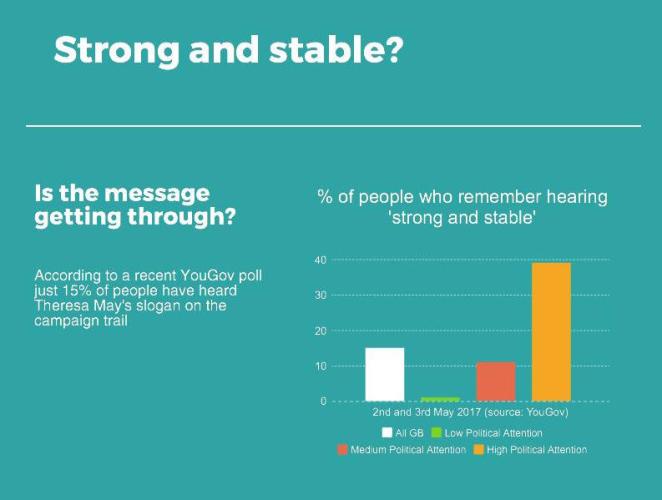As the country ticks down to the general election on June 8 soundbites appear to be taking over.
Strong and stable, coalition of chaos, for the many and not the few – the audience has been on the receiving end of them all.
But are soundbites starting to take over genuine debate on policy in this election campaign?
“Soundbites in elections are nothing new, though given that this is a snap general election there is less time for analysis of policies,” said Dr Simon Choat of Kingston University.
“Soundbites can backfire, however, if the public see through them.
“For example, how many times can you hear the Conservatives talk about how they are ‘strong and stable’ without it beginning to sound hollow?
“[Jeremy] Corbyn tends to rely less on soundbites, which may be one reason that much of the media, which relies on soundbites, dislike him.”
As Dr Choat alludes to, plenty of ridicule is coming the way of politicians who seem to be overusing the same slogans time and again.
In an appearance on The Andrew Marr Show on April 30, for example, the first question posed to Theresa May by the former BBC political editor was: “Can we agree to start with, that the one thing that voters deserve, is no soundbites?”
Perhaps unsurprisingly, it was moments before the words ‘strong and stable leadership’ were uttered.
For Dr Choat he only sees the current state of political debate as a negative for British society.
“Despite the growth of the internet and social media, in the UK the print media still have a huge influence on political discourse,” he added.
“Most national newspapers are owned by billionaires more interested in pursuing their own interests than in encouraging debate or enlightening the public.”
Carshalton and Wallington MP Tom Brake, who is standing for re-election in the constituency, also believes the quality of debate is a negative.
“I am not impressed with the standard of debate so far,” said the Liberal Democrat.
“Voters are entitled to hear in detail from all the parties on their proposals for funding the NHS, schools and minimising the damage Brexit will do to the UK economy.
“Repeating slogans like ‘strong and stable’ is not the policy debate we deserve.”

But are the messages really hitting home? Is political debate in Britain as bad as is suggested and do soundbites play an important role?
David Cameron’s former chief of staff, Alex Deane, believes so.
“The conventional thing is to say it’s rubbish but actually I think the standard of our debate in this country is not bad,” he explained.
“If you look at the debate that [Marine] Le Pen and [Emmanuel] Macron just had in France I think British public discourse holds up very favourably in comparison with that – where it got very personal, very ugly and very quickly.
“Soundbites sound hollow to you and me because we are political junkies and we hear them all the time.
“Those soundbites do not sound hollow to most people in the public, who have more important things going on in their lives than the election, and are focused on other stuff.
“That doesn’t make them less engaged or less interested or less clever.”
Indeed a recent YouGov poll, displayed in the infographic, found that just 15% of Britons claim to have heard the phrase ‘strong and stable’.
According to Mr Deane that is proof that you do need to keep saying soundbites over again to deliver the message.
Another talking point in the campaign referred to the Prime Minister and Jeremy Corbyn refusing to take part in television debates.
However, despite the clamor to hold such debates Mr Deane believes they only serve to promote the reliance on soundbites.
“You get almost no substance in debates,” he said.
“People complain about the obsession with soundbites, and the obsession with personality politics, and then they say they really want to listen to debates.
“What do you get in debates? Soundbites and personality politics.”
Time will tell which of the campaigns come out on top when the country goes to the polls on June 8.
But one thing is for sure – regardless of people’s opinions on soundbites they cannot be ignored.




